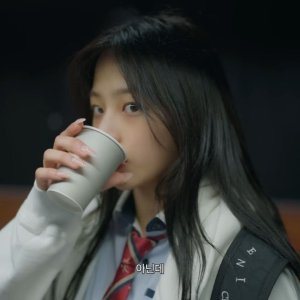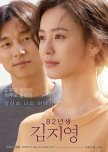Cette critique peut contenir des spoilers
Book vs. Film
As the saying goes: the book was better. Not to say the movie is bad, quite the contrary, I did enjoy it, but it didn't introduce Jiyoung's story as well to me as the book did.
The book is divided into sections, showing Jiyoung's life as she grows up, her childhood, her teen years, her adult life in college than working and finally her marriage as we see her mental health deteriorate due to the years of misogyny she - and every woman living in korea - suffered.
The movie on the other hand, spends most of it's time on married Jiyoung and her life as a housewife and mother, showing a handful of scenes of her life growing up, which to me took away the build up the book did so well and excluded really relevant and important scenes from her early years which showed not only her but her family dynamic as well, instead what they did was include scenes that TELL the audience "this is why Jiyoung is unwell", which didn't work for me.
I can't help but feel like that happened because they casted big names to play Jiyoung and her husband, so they didn't want to spend most of the movie on other actors that would play young Jiyoung and when her husband wasn't present in her life which would be most of the story, and the reason why I get that feeling is because they introduced scenes from the husband's point of view that don't exist in the book, and these scenes don't need to exist because the topics discussed in them - sexual assault and sexual harassment in the work place - are present in Jiyoung's life, we see them through her as she directly suffers from them, so they're more impactful.
The only thing these scenes added to the narrative was to show the difficulties women face in korean society and to show Jiyoung's mental health issues from the perspective of the husband, but both of them are already done well in the book without taking away her point of view, or they were done in a way that complimented her story in a better way, so to me it really felt like "oh we have to give Gong Yoo more scenes, it's Gong Yoo!".
As for the endings: I do prefer the open ending of the book, a sort of Twilight Zone ending, with no hope to it, because we end up with the feeling that this isn't a situation that can be resolved, because misogyny will always be present, hurting women everywhere little by little, taking away from our soul, or even that this situation is exclusive to Jiyoung, she is just one of many women who broke under our patriarchal society. So while the hopeful/happy ending of the film was a nice watch, it wasn't as impactful to me.
So basically if I hadn't read the book before watching the movie I would've enjoyed much more, because it is a good movie that showcases well the misogyny korean women face on a daily basis, while also, just like the book, remaining true to the experiences women everywhere face. BUT....... the book was better ;)
The book is divided into sections, showing Jiyoung's life as she grows up, her childhood, her teen years, her adult life in college than working and finally her marriage as we see her mental health deteriorate due to the years of misogyny she - and every woman living in korea - suffered.
The movie on the other hand, spends most of it's time on married Jiyoung and her life as a housewife and mother, showing a handful of scenes of her life growing up, which to me took away the build up the book did so well and excluded really relevant and important scenes from her early years which showed not only her but her family dynamic as well, instead what they did was include scenes that TELL the audience "this is why Jiyoung is unwell", which didn't work for me.
I can't help but feel like that happened because they casted big names to play Jiyoung and her husband, so they didn't want to spend most of the movie on other actors that would play young Jiyoung and when her husband wasn't present in her life which would be most of the story, and the reason why I get that feeling is because they introduced scenes from the husband's point of view that don't exist in the book, and these scenes don't need to exist because the topics discussed in them - sexual assault and sexual harassment in the work place - are present in Jiyoung's life, we see them through her as she directly suffers from them, so they're more impactful.
The only thing these scenes added to the narrative was to show the difficulties women face in korean society and to show Jiyoung's mental health issues from the perspective of the husband, but both of them are already done well in the book without taking away her point of view, or they were done in a way that complimented her story in a better way, so to me it really felt like "oh we have to give Gong Yoo more scenes, it's Gong Yoo!".
As for the endings: I do prefer the open ending of the book, a sort of Twilight Zone ending, with no hope to it, because we end up with the feeling that this isn't a situation that can be resolved, because misogyny will always be present, hurting women everywhere little by little, taking away from our soul, or even that this situation is exclusive to Jiyoung, she is just one of many women who broke under our patriarchal society. So while the hopeful/happy ending of the film was a nice watch, it wasn't as impactful to me.
So basically if I hadn't read the book before watching the movie I would've enjoyed much more, because it is a good movie that showcases well the misogyny korean women face on a daily basis, while also, just like the book, remaining true to the experiences women everywhere face. BUT....... the book was better ;)
Cet avis était-il utile?


























